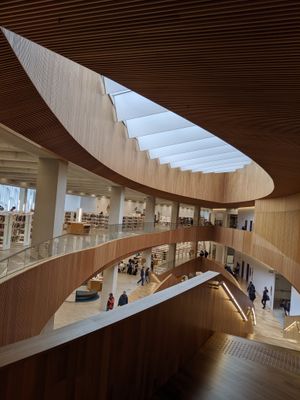The Library at University College Dublin (UCD) invited expressions of interest in a “website and online environment consultancy” a while ago. I thought that the document they prepared as background was nicely done, and that although specific in many ways to UCD it represented a general statement of common issues being addressed by libraries as they grapple with what constitutes an effective web presence.
Reading the document two general questions came through for me (expressed in my words):
- How does one create some unity of approach across the resources to be presented, in terms both of management and presentation? Some of this discussion is about whether it makes sense to move away from a web-page list/browse presentation to a more managed environment for particular resources. Examples would be moving all electronic resources into Metalib or using LibGuides for library subject guides. I was struck by this comment about the catalogue:
We have taken it for granted that the catalogue as a separate search interface can happily retain a different look and feel from the website and other interfaces but many of our users do not differentiate the online library platforms in this way [UCD Library Web Consultancy].
They point to the use of Collexis by the Technical University of Delft to provide search based access to information about the library and its services, and wonder if this approach is preferable to the more common static web page approach.
- The second question is in some ways more interesting, and more difficult. The document notes that the university has several network environments (course management system, University portal), and this raises questions about the best target environment for library attention. In which environment should services be delivered?
There is also some consideration of general Web 2.0 considerations, although I liked that they resisted the temptation to lead with this.
They ask this question:
Is there a case for our online presence in effect becoming “the library” and the physical library actually becoming a sort of support or adjunct? Our thinking to date has not moved beyond viewing the online environment as an important, but subordinate component and our entire structure reflects that perspective. [UCD Library Web Consultancy]
Until recently, library place, expertise, and services were vertically integrated around collections. Space was needed to house collections and allow readers and writers to consult with collections. Expertise organized and interpreted them. Services provided access to them. However this is all reconfigured in a network environment where readers and writers have many resources to call on. In this context, place, expertise, collections and services continue to co-evolve but are not so closely integrated in the same way and need to be managed to different ends. So, for example there may be more emphasis on social learning, on high value face to face interaction, on access to scarce equipment or expertise in the context of place. Or, again, library network services will look more to placing expertise or collections at the point of need in research and learning workflows, and at managing institutional outputs.
Thanks to Ros Pan for the link.
Related entries:



